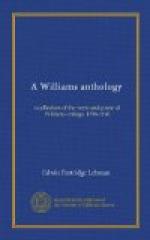In a letter to Miss Sara Hennel, George Eliot writes that “there are but two kinds of regular correspondence possible—one of simple affection, which gives a picture of all the details, painful and pleasurable, that a loving heart pines after ..., and one purely moral and intellectual, carried on for the sake of ghostly edification in which each party has to put salt on the tails of all sorts of ideas on all sorts of subjects.” These two classes embrace, perhaps, the great bulk of letters, but George Eliot says there is a third class to which her correspondence with Miss Hennel belongs—one of impulse. Strictly speaking, all of the letters which really belong as such to literature come under this last head. The result of a perfect fusion of the two other styles, they exhibit a sparkle, a pungency, and lightness of touch, which take the curse from mere gossip, supple the joints of intellectual disquisition, and mark unmistakably the epistolary artist. The letter-writer, no less than the poet, is born, not made, and his art, though for the most part unconscious, is no less an art. The expression of every sentiment, the choice of every word, however random it may seem, is determined for the born enditer of epistles by a sense of fitness so exquisite that its niceties of distinction escape analysis and only its more general principles can be enunciated.
The most vital of these principles is pretty generally observed. Thackeray perceives it when at the close of a delightful letter to Mrs. Brookfield he exclaims, “Why, this is almost as good as talk!” He was right: it was written talk. If read aloud with pauses for the correspondent’s reply, the perfect letter would make perfect conversation. It should call up the voice, gesture, and bearing of the writer. Though it may be more studied than oral speech, it must appear no less impromptu. This, indeed, is its essential charm, that it contains the mind’s first fruits with the bloom on, that it exhale carelessly the mixed fragrance of the spirit like a handful of wild flowers not sorted for the parlor table but, as gathered among the fields, haphazard, with here a violet, there a spice of mint, a strawberry blossom from the hillside, and a sprig of bittersweet. This is the opportunity for the clergyman to show that he is not all theologian, but part naturalist; the farmer that he is not all ploughman, but part philosopher. This is the place for little buds of sentiment, short flights of poetry, wise sermons all in three lines, odd conceits, small jests rubbing noses with deacon-browed moralities; in short, for every fine extravagance in which the mind at play delights. Sickness and sorrow, too, and death, if spoken of reverently and bravely, must not be denied a place. So we shall have a letter now all grave, now all gay, but generally, if it be a good letter, part grave, part gay, just as the mingled threads are clipped from the webs of life.




